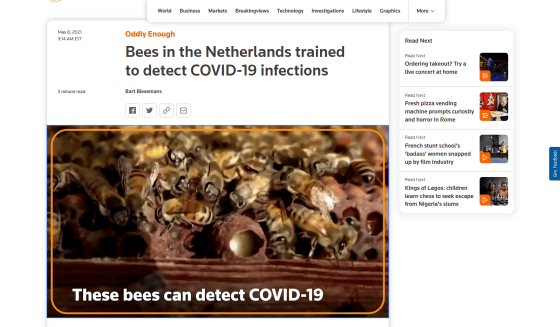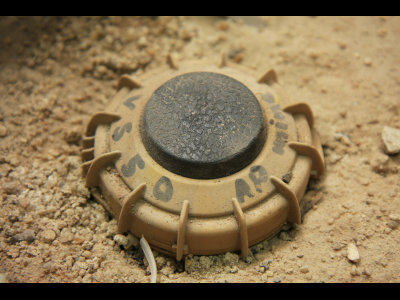Bees may lead to the development of an inexpensive test method that can distinguish the 'smell of the new coronavirus'.

In the test for new coronavirus infection (COVID-19),
Training bees to smell the coronavirus --WUR
https://www.wur.nl/en/news-wur/Show/Training-bees-to-smell-the-coronavirus.htm
Bees in the Netherlands trained to detect COVID-19 infections | Reuters
https://www.reuters.com/lifestyle/oddly-enough/bees-netherlands-trained-detect-covid-19-infections-2021-05-06/

Attempts have long been made to use animals with a better sense of smell than humans in detecting disease. In the past, experiments have been successful in training dogs to sniff out SARS-CoV-2, and dogs are COVID-19-positive patients with urine that is relatively low in SARS-CoV-2 in the sample. It is known that samples taken from can be identified.
Many people may think of dogs as animals with a good sense of smell, but in fact, honeybees are also a type of animal with a good sense of smell. Bees can use their excellent sense of smell to detect volatile substances in the air and find flowers that are several kilometers away. Therefore, the research team wondered if it would be possible to make honeybees remember the odor of SARS-CoV-2 and identify samples taken from animals infected with SARS-CoV-2.

First, the research team exposed the bees to the 'scent of samples infected with SARS-CoV-2' and rewarded them with sugar water each time. The bees then stretch their tongues to lick the sugar water, but by repeating the same actions, the bees combine the scent of SARS-CoV-2 with the reward of sugar water, and eventually they just smell SARS-CoV-2. It seems that he will stretch his tongue.
According to the research team, honeybees began to stretch their tongue in response to the smell of SARS-CoV-2 in just a few minutes of training without the reward of sugar water. Trained bees can identify whether a sample is infected with SARS-CoV-2 within seconds of being exposed to the odor of the sample, the researchers say.
The research team then investigated the detection accuracy of more than 150 honeybees trained using this method.
With general testing methods, it can take hours to days for the sample provider to know if they are infected with SARS-CoV-2, but testing with honeybees can be quick. The result will be known. The research team also argued that this test method is so inexpensive that it could be beneficial in countries where test kits are scarce.

Insect Sence is already working on scaling up the inspection method using honeybees, and is developing a machine for training honeybees and a prototype of a biosensor using honeybees. Meanwhile, Professor Dirk de Graaf, who studies honeybees at Ghent University in Belgium, said, 'This is a good idea, but I prefer to use classical diagnostic tools rather than using honeybees. I love honeybees, but I would like to use them for purposes other than detecting COVID-19. ' He immediately pointed out that bee testing would not replace traditional testing methods.
Related Posts:







